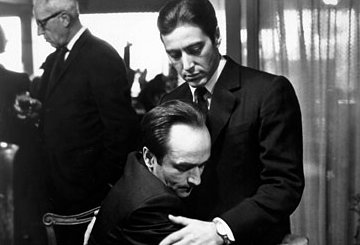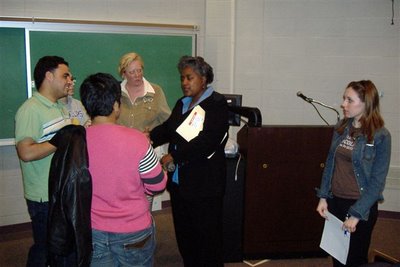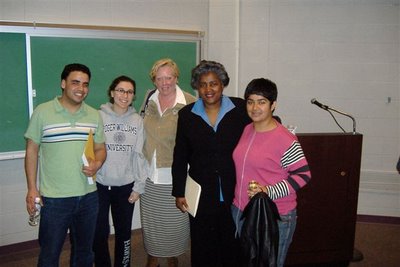I could turn this into a creative writing piece, and write a psychological thriller about a young man and the choices he made. I could even pull a Capote, and turn this piece into my magnum opus, a fixture on some best-seller list because it so chillingly captured real events that occurred in my own lifetime.
Over the past two days, in fact.
There are two problems with doing this. The first? Bad taste.
The second is a problem that all English/Creative Writing students face, which is being assaulted by the need to write or express a thought, an assault worse than an itch in the middle of your back, because it doesn't go away, and leaves you with no peace to think about form, and narrative style. I’m sorry, Truman. I failed you. There’s no best seller here, no carefully crafted piece of new reportage. I'm just a student who's realized she can't complete her thesis unless she puts this itch down in words.
The past two days have been filled with events and changes. A country’s in upheaval. 33 families have lost their reason to leave their porch light on. A university is left feeling ravaged. A media circus is in full swing, and someone just yelled “send in the clowns”. Facebook is suddenly very popular. Several students all around the U.S.A realized they had always disliked Koreans. An entire Asian country felt it needed to tell America that the shootings were not part of some terrorist conspiracy. A section of this country is waiting to see what Oprah will say about this. A section of this country is waiting to see what God will say about this. A certain political lobby group is trying to find the best and most genial way of keeping the hunting season open, as the pope from his ivory tower decried the propogation of violence in this, the land of the free.
And early this morning, a newspaper published an article saying that the VA killings are “widely seen as reflecting a violent society”
The massacre at Virginia Tech was very violent, so violent that it has made me numb in ways that 9/11 never did. Maybe it was because Ground Zero was a direct result of socio-politic-economic strife. Maybe because the victims at V. Tech were chosen randomly. Maybe because many of them would’ve graduated around the same time I will. Maybe because they were taken when they were at their most beautiful, on the threshold of adult life. Maybe because I can still visit their profiles on various social networks online, like Orkut and Facebook, and can see how their life was stopped so suddenly, how they had no foreknowledge, no time to make phone calls or close email accounts. Maybe because television networks are scrambling for any video clips or interviews that can and will boost the number of hits on their web pages. Maybe because of the Indians who were also killed, who were in this country with the sole purpose of academic pursuit, whose families are left grieving back home in my country, trying to make sense of a senseless tragedy.
Mostly though, it's because I could just as easily have been a student at V Tech as I am one at Roger Williams. Maybe because anyone of those victims could’ve been me, if it hadn’t been for the simple fact of place and time, and chance.
But here’s what’s got me awake in the middle of the night, stirring coffee. These 33 human beings weren’t near any war front. They weren’t even part of some huge capitalist venture that would’ve made them symbolic targets.
They were just kids. And they were shot for reasons far more subtle than Fox or CNN will ever discover.
Sure, America today has a violent society. Which country doesn’t? Every country, I repeat, every country has its own share of available firearms. The only factor that varies is whether a person can procure a gun legally, or illegally. Every country has a mob. Every country has natural disasters, street violence, drug abuse, and exploitive news networks. Every country’s film industry has movies that show people getting shot, cars being blown up, women being chased.
War happens all over. Sh*t happens, all over. People get shot, mugged, killed, raped, murdered, run over, knifed and drowned all the time. What makes the actions of Cho Seung-Hui different is motive. Or the lack thereof.
You could say the kid was crazy. You could say he was psychotic, had always been that way, that his writing holds signs of a mind on the edge of some act of violence, and you would be right.
You would also be right if you said he was lonely. Alone, even. Which is to say, without friends. Without a social group to help him cope with a world that has most of us thinking that we wouldn't get by if it wasn't for our drugs, caffeine and otherwise.
No. I’m not justifying his actions. The shootings resulted in the worst kind of deaths— random loss of young life, individuals who were filled with the potential of making this world a better place. I am horrified by what happened. I cannot continue work on my thesis, because of what happened.
Cho was a time bomb waiting to explode. An anomaly, an uncomfortable presence on campus, in the dorm, and in his classes. He wrote weird. He looked weird. He sounded weird. Essentially, he was the freak that everyone was polite to, and most everyone avoided. In early interviews, most students at V Tech had no clue who Cho was.
V Tech is a much larger campus than Roger Williams University. RWU is what you would call a close community, classes that are kept as small and tight knit as is possible to ensure all kids get maximum attention from their professors. My classes, be they creative writing, political science or English, are usually not much bigger than 15, once or twice having gone up to about thirty.
Yet, on may 19th, I will graduate as quietly and anonymously as Cho would’ve, if he hadn’t gone over the edge, if he perhaps, had remembered to take his medication. And that's what's bothering me.
Sure, I got friends. I'm even on Facebook. But I survive on campus relatively on my own. Just me and my iPod, on my way to class, just like you do often, because sometimes the crowd gets too much. Sometimes the fact you don’t belong to a group, because you aren’t a specific type leaves you in a very solitary place.
Cho had problems. But he probably wouldn’t have shot anyone—maybe—if he had had more people to talk to.
That’s not to say that every loner on every campus is a threat to the rest of the learning community.
That means that the sickness in American society is not because of its violence-- the world in general, as Hobbes declared, tends to be a violent, anarchic mess-- but because of the isolated lives people in this country, whether residents or immigrants, end up living. You only speak to your group. You only live within your group. Which is perfectly understandable, because as humans we are programmed to be social animals. But the problem with groups is, there will always be the fringe. The outsiders.
The people who are the only one of their kind in certain space, either based on their mental make up or their physical appearance.
Wait, maybe I could write a story.
This story could be about a young kid who moves to the U.S when he was 8, who was always a bit of a loner because his folks worked hard all the time, and were first generation immigrants, which meant they didn’t speak American well, and that his dad didn’t have a favorite hockey team. The kid was the only Asian around, and no girl wanted to date him because he wasn’t blond.
No wait— scratch that, too easy.
The kid was Asian and lived in a neighborhood filled with primarily Asian families, but the desperation of the need to find your own kind in this country, to stay together because the outside world is scary, was too much for him. Maybe he was tired of being told to jump into stereotypes: to take Kung Fu classes, to use chop sticks, to love computer programming. So maybe, just maybe, he drew further away into himself. He heard Pearl Jam’s Jeremy and thought, yeah that kid in that song, that kid was finally free, finally happy after what he did.
No wait, Jesus, that's too predictable.
How about this—maybe he grew up, and had posters of Martin Luther King Jr. on his wall, and listened to Nirvana; he was also vegetarian. And maybe the first time he tried to talk about Martin Luther King or Cobain, somebody laughed at him. Or stared at him. Or said hey, we didn’t know your people knew about the Civil Rights Movement.
Maybe this kid spoke broken English, because his parents did as well. Or maybe, he spoke flawlessly, and read Shakespeare and Baraka, but one day a girl with earnest eyes told him that she would never believe he was Chinese/Indian/Korean/Nepali/Pakistani/Martian because he spoke such good English.
And maybe he got angry. And maybe he got lonely. And maybe, one grey early spring day, he went into a gun store with money and thought he found his path.
Life isn't Oprah, though I wish it was, and I am not looking for a group hug. But maybe if Cho had had more people to talk to, he wouldn’t have ended things the way he did. One of his professors, when interviewed, said that he had always scared her a little. That there was something not quite right about him.
There’s something not quite right with all of us.
Blessed are those with cliques and similar hair color: they will always have company to watch 'Lost' with. Blessed are those into sports, for they can always throw, punch or run their anger a way.
Blessed are the drugged, for whether on weed or Adderall, their quiet desperation brings them together. Blessed are the smokers, the tokers, the Goths, the preps, the blonds, the actors, the poets, the brunettes, the nerds, the sk8ers, the pea-coat wearers with their eternal promise of coffee cup poetry, the mists of the joy that comes from being part of an elite intelligentsia fogging up their spectacles.
Blessed are those that love Tolkien, for they shall inherit Middle Earth. Blessed are those that see the point of this paragraph, for they, hopefully, are asking questions. Questions like, what about those with no group identifiers? What about those who because of situation or self are left alone in the fishbowl of college life?
Cho Seung-Hui obviously needed help. He didn’t just need communication, he also needed professional care. In an interview with CNN, his former room mates came across as young men who reacted to their silent room mate in much the same way we all would've: they were courteous, they tried to involve him in group activities and when they realized he and the group weren't comfortable with that dynamic, they tried to leave him in peace. They also grew uncomfortable when they encountered examples of his neurotic behavior, and tried to intervene to the best of their ability.
In a way, they did more than the average American student would've. What more can be done with a troubled class mate?
In
a separate interview with CNN, Criminology professor Jack Levin talks about the effects of social isolation:
Now, of course, there are millions of people in that situation. They don't kill anybody. But it seems to me that, when you put that together, the social isolation, with the fact that I believe he suffered some catastrophic losses -- I'm not sure whether it was the loss of a girlfriend, the loss of money, the loss of his position on the campus, or maybe all of those things. But suffering this kind of loss as a precipitant probably pushed him over the edge. You're talking about an extremely depressed person.
Here is an extract of the interview with Levin. The full transcript is available
here.
ZAHN: ... Let's come back to the issue of his writing... If you were to have seen this, his work from a playwriting class where he wrote, "I want to kill him, Jane"... would that have alarmed you? LEVIN: Well, I'm sure it would have alarmed me. However, I have to put this in perspective, after having studied these mass killers for more than 25 years. And I can tell you that they usually do not issue a threat beforehand... And, you know, keep in mind that we could be talking about novelist Stephen King, who also fantasized about violence, and wrote prolifically about it... But the question is, then, what do you do with that information? You know, in high schools and middle schools around the country, under zero-tolerance policies, if a youngster wrote about violence in an essay, could be expelled. Now, in most cases, these youngsters who wrote about violence did so because they could never actually express it with the -- through the barrel of a gun. Usually, this is a way of dealing with violence , in a safe, pretty innocuous way. So, you know, I have to tell you something, Paula. I -- of course, I wish I could tell people that these warning signs could protect us in the future... The truth about this is... We should be caring about people who are troubled long before they become troublesome. We should reach out to people... not to punish them, but to give them our concern, our caring. “We should reach out to people”
Professor, I couldn’t agree with you more. Whether it's letting a person know they are not the only one, or becoming aware of a troubled individual, and reacting pro actively to him or her, talking can only help on campuses in America, and around the world.
In the CNN interview with Cho’s former room mates, it came up that he would listen to a certain song by Collective Soul on repeat, and this was it:
Give me a word
Give me a sign
Show me where to look
Tell what will I find ( will I find )
Lay me on the ground
Fly me in the sky
Show me where to look
Tell me what will I find ( will I find )
Oh, heaven let your light shine down (x4)
Love is in the water
Love is in the air
Show me where to go
Tell me will love be there ( love be there )
Teach me how to speak
Teach me how to share
Teach me where to go
Tell me will love be there ( love be there )
Oh, heaven let your light shine down (x4)
I’m going to let it shine (x2)
Heavens little light gonna shine on me
Yea yea heavens little light gonna shine on me
Its gonna shine, shine on me
Its gonna shine, come on in shine
There's a lot of hurt right now. Lots of rage. Lots of lives that should still be living right now. But why the VA massacre will always be different from any other previous act of violence on campuses is that it was carried out by a young man who leaped off the edge, who never had any sort of hand around to help pull him back.
That thesis is still going to be hard to work on today. I can only add my bit to the prayers being murmured and cried over by parents, best friends, lovers and teachers.
Dear god, please be there.
Take care of the group that came to you on April 16th. Soothe them,
and keep them safe up there till they are reunited with their families.
Show us our own path to love, and light.
Keep us from harming and hating each other,
Keep us from being alone. Keep the Hokie flame burning bright.
Amen. Whoever's up there, please, Amen.











